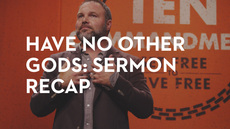My current preaching series on the Ten Commandments is expressly dealing with what is referred to as “the Law.” While most everyone would agree that at least some of the laws in the Old Testament should apply today—no one wants to be robbed and then killed, for example—the controversial question is whether or not all Old Testament laws are binding on Christians today.
This issue is timely, as it has become popular to mock Old Testament laws as outdated, for example, whenever the issue of homosexuality arises in the media. The common way this plays out on television talk shows is simple: The Christian says that the Bible forbids homosexuality. The non-Christian then says that the Bible also forbids eating crab and wearing a poly-cotton blend shirt. Everyone laughs, the Christian loses, and the audience goes home to watch porn.
Some laws no longer apply . . .
When the Bible speaks of law, it usually refers to what human beings are commanded to do by God. This includes not only the Ten Commandments, but all 613 laws listed in the first five books of the Old Testament.
One noted theologian on the law said that the New Testament “clearly teaches that Christians are no longer under the law covenant instituted under Moses.” This is why, when the Bible speaks of the “old covenant” in comparison to the “new covenant,” it is showing us that we are no longer under the law and obligated to it. He goes on to explain, “Romans 10:4 asserts that Christ is the end of the law. . . . Christ is the goal to which the law points; and when the goal is reached, the law also comes to an end.” The entire book of Hebrews is in large part devoted to explaining how Jesus has brought an end to the old covenant law, which is why we do not need a high priest, temple, sacrificial system, and the like. Jesus is our High Priest, the presence of God, and the payment for sin.
This fulfillment of the law explains why certain foods, circumcision, Passover, animal sacrifices, and the Sabbath that were binding in the old covenant are not binding in the new covenant. That new covenant believers no longer live under the old covenant ceremonial and civil law also explains why more obscure commands are no longer binding, such as requiring any male who ejaculates in his sleep to leave town for a season and bathe in a river, disciplining people for eating shellfish, or forbidding clothes made of two kinds of fabric.
. . . but some laws do.
However, there are some moral laws that are listed in both the Old Testament and New Testament. These include every one of the Ten Commandments—with the exception of keeping the Sabbath—including not committing idolatry, honoring parents, not murdering, not committing adultery, not stealing, not lying, and not coveting.
Determining which laws continue from the old covenant to the new covenant is admittedly difficult. One helpful distinction that can be traced back to the church father Tertullian (AD 160–222) is spoken of by Martin Luther (1483–1546) and is found in the Westminster Confession of Faith (1646).
- Ceremonial laws—referring to the priesthood, sacrifices, temple, cleanness, and so forth, are now fulfilled in Jesus. These laws are no longer binding on us because Jesus is our priest, temple, sacrifice, cleanser, and so forth.
- Civil laws—pertaining to the governing of Israel as a nation ruled by God. Since we are no longer a theocracy, we believe these laws, while insightful, are not directly binding on us. Romans 13:1–7 says to obey even non-Christian governments because God will work through them too.
- Moral laws—forbidding such things as rape, stealing, and murder. These laws are still binding upon us, even though Jesus fulfilled their requirements through his sinless life.
Categories 1 and 2 are no longer binding, but category 3 is.
It's like high school
In closing, perhaps a simple illustration will help. In high school there are a lot of rules/laws/requirements that I needed to abide by in order to get an acceptable report card and graduate. Once graduated, some of the laws at my school remained binding upon me while others were fulfilled and are no longer binding. For example, in my school I was not supposed to stab people, blow up public property, or pull fire alarms. Even though I have graduated, those laws remain binding upon me for the rest of my life.
There were other laws, however, that are no longer binding because the requirements were fulfilled. For example, I had to show up a certain number of days for a certain number of hours, I had to sit in class, and I had to take tests and pass them. Now that I have graduated, I no longer have to do any of those things because the demands of the law were fulfilled, which culminated in my graduation.
Similarly, Jesus went to school for me. He got straight A’s in life without ever sinning. He passed every moral test he took. He met every requirement of the law. And, by grace he is my report card. He has given me his GPA/righteousness and because of that I have graduated from the law and am no longer bound by its demands as I once was (Gal. 3:24–26).
However, Jesus is also my Lord and he has chosen some moral laws to remain binding upon me for his glory, and for other's good. So, I can eat shellfish while wearing a poly-cotton blend but I still cannot murder my neighbor or steal from my employer. Jesus wants me to obey these laws not for my righteousness, but from my righteousness in him and out of love for him and my neighbor.
Portions of this blog were adapted from Real Marriage: The Truth About Sex, Friendship and Life Together, which I wrote with my wife, Grace.















